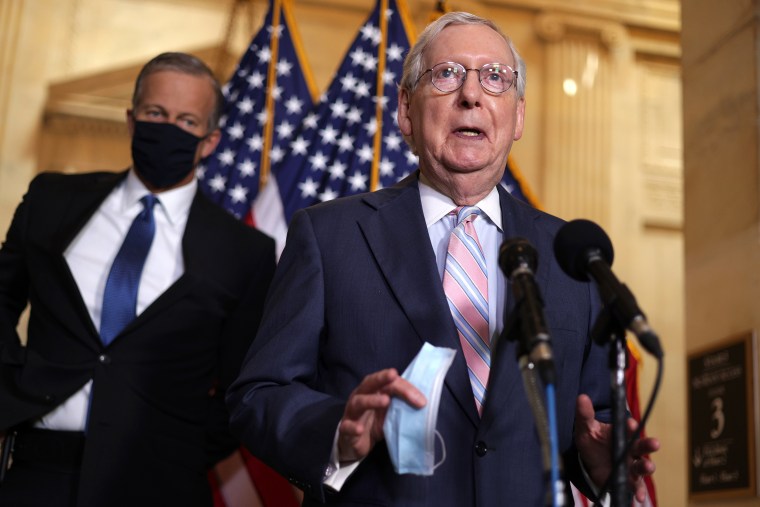President Joe Biden hasn't just talked about his eagerness to strike a bipartisan deal on infrastructure, he's invested quite a bit of time and energy into trying to reach an agreement. Not surprisingly, Republicans are showing up for negotiations, but they're not exactly making the process easy.
The good news is, GOP leaders have at least paid lip service to the idea of a larger bill. A few weeks ago, Senate Republicans put forward a $568 billion plan -- which was actually far smaller than it appeared -- that was a far cry from the White House's $2 trillion proposal. This week, GOP leaders said the "proper price tag" could go as high as $800 billion, which is still inadequate, but which is a modest step in the right direction.
That's the good news. The bad news is ... well, there's a lot of bad news.
For one thing, GOP officials continue to reject the White House's ideas about what actually constitutes "infrastructure." For another, Democrats are determined to include climate priorities in any infrastructure package, and for Republicans, that's a problem, too.
But perhaps most important is the disagreement over how to pay for the necessary investments. Politico reported:
Republican leaders told President Joe Biden on Wednesday that they will draw a hard line on raising taxes to pay for infrastructure, demonstrating the substantial challenges ahead for a potential bipartisan deal on Biden's infrastructure and jobs plan. Democrats and Republicans left the meeting saying they would try to zero in on areas of agreement they could reach on a bipartisan bill. In reality, they sound like they are starting from scratch.
For Biden, the obvious way to pay for an infrastructure package, at least in part, is to roll back some of the Republicans' ineffective tax breaks from 2017. That is a line the GOP will not cross.
"We're not interested in re-opening the 2017 tax bill. We both made that clear with the president. That's our red line," Senate Minority Leader Mitch McConnell (R-Ky.) told reporters outside the White House yesterday. "This discussion ... will not include revisiting the 2017 tax bill."
If the rhetoric sounded familiar, it's not your imagination. Sen. John Barrasso (R-Wyo.), the No. 3 GOP leader, also described the 2017 package of tax breaks as a "red line" for Senate Republicans earlier this week. Sen. Shelly Moore Capito (R-W.Va.), who's taken a prominent role in the negotiations, also recently characterized the Trump-era tax cuts as "a non-negotiable red line" for her party.
Not to put too fine a point on this, but if Republicans won't touch one penny of the 2017 package, then financing a bipartisan infrastructure compromise won't happen.
It shouldn't have to be this way. As we've discussed, raising the corporate tax rate from 21% to 28%, for example, is quite popular with the American mainstream. The idea has also drawn support from Gary Cohn -- who helped negotiate the Republican tax plan as the then-director of Donald Trump's National Economic Council.
Perhaps most importantly, the GOP's corporate tax cut -- the one Democrats intend to scale back in part -- set out to achieve certain policy goals, and failed spectacularly. It leaves Republicans in a position in which they're refusing to consider any changes to a policy that demonstrably failed.
This is likely to have real-world consequences: the more McConnell & Co. play these games, the more likely it is that Democrats will feel as if they have no choice but to pass their own bill through the budget reconciliation process, leaving Republicans behind.
Democrats such as West Virginia's Joe Manchin don't want that to happen, but Congress' most conservative Democrat also recently said that Republicans aren't approaching the debate in a "reasonable" way.
The GOP's fixation on its "red line" suggests being reasonable isn't part of the party's plan.
Don't be surprised if Biden eventually comes to the conclusion that McConnell has given him an offramp. The president made a good-faith effort, and offered compromises, but Republicans were simply too committed to corporate tax breaks that don't work. If, at that point, Biden were to effectively tell Manchin, "I gave it my best shot, but it's either reconciliation or failure," would the West Virginian choose the latter? Simply because Republicans said so?
Watch this space.

